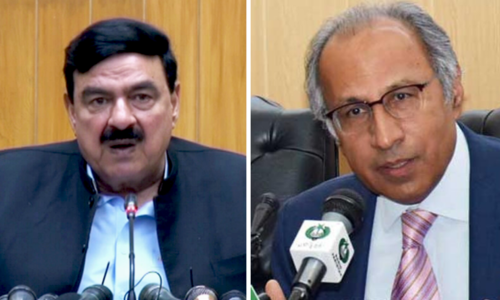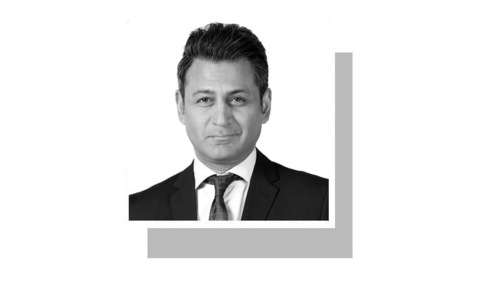ISLAMABAD: Though the cabinet reshuffle may take some pressure off the government in light of the Islamabad High Court’s (IHC) recent judgement stating that unelected advisers cannot hold executive responsibilities, the working of important official functionaries remains clouded in uncertainty.
IHC Justice Aamer Farooq, on a petition filed by PML-N lawmaker Rana Iradat Sharif, had ruled that advisers and special assistants could assist and advise the prime minister on their respective subjects but not intervene in the executive’s domain.
After the court threw out the notification about setting up of the Cabinet Committee on Privatisation (CCoP) and practically ending any role of the PM’s aides in policy-making, the government has belatedly started contemplating various options to deal with the crisis.
Friday’s cabinet reshuffle was one such move in which Adviser on Finance and Revenue Abdul Hafeez Shaikh was sworn in as a federal minister. However, he was deprived of the portfolio of revenue division. On the other hand, the status and functioning of other advisers like Abdul Razak Dawood remain uncertain.
Minister cites earlier SC order, says no issue in enforcing judgement
After Dr Shaikh’s elevation as a federal minister, the government is left with four advisers — Abdul Razak Dawood (Commerce), Dr Ishrat Hussain (Institutional Reforms), Mirza Shahzad Akbar (Interior) and Dr Babar Awan (Parliamentary Affairs).
The special assistants to the prime minister (SAPM) include Ali Nawaz Awan who looks after the Capital Development Authority affairs, Mohammad Shahzad Arbab, establishment; Raoof Hasan, information; Faisal Sultan, health; Moeed Yusuf, National Security Division; Syed Zulfiqar Abbas Bukhari, overseas Pakistanis; Nadeem Afzal Gondal, parliamentary coordination; Nadeem Babar, petroleum; Amir Dogar, political affairs; Sania Nishtar, poverty alleviation; Shahbaz Gill, political communication; Tabish Gauhar, Power Division; Malik Amin Aslam, climate change; Dr Waqar Masood Khan, revenue and Usman Dar, youth affairs.
The high court’s order, however, affects the working of those among the prime minister’s aides who are heading ministries, exercising executive powers and are members of cabinet committees or are presiding over them.
PML-N MNA Barrister Mohsin Nawaz Ranjha, who pleaded the case on behalf of the petitioner, said he would ask the cabinet secretary to get offices in the ministries vacated from the advisers and special assistants.
Dr Hafeez Shaikh was heading four major committees of the National Economic Council or the federal cabinet that are established under the rules of business 1973. These included Executive Committee of the National Economic Council (Ecnec), Economic Coordination Committee (ECC) of the Cabinet, Cabinet Committee on Privatisation (CCoP) that was challenged in the court and Cabinet Committee on State Owned Enterprises (CCOSOE). Other committees under Dr Shaikh’s leadership included important forums like implementation committee on IPPs, National Price Monitoring Committee and National Logistics Committee.
According to a senior official of the finance ministry, the court had validly ordered that matters of the state be run in a manner that were legally tenable but it was feared that the institutional performance of the divisions under Dr Shaikh would suffer if he was confined to “only advising” the prime minister and wait for instructions to flow back from the PM Office rather than “instruct or order” himself.
Earlier this week the prime minister, when asked by senior journalists about the limits put by the IHC judgement on the working of his unelected advisers, had said he would “find some solution”.
This was found in the rarely used Article 91(9) of the Constitution which the previous PML-N government had applied to appoint Miftah Ismail as minister for finance, revenue and economic affairs after Ishaq Dar relinquished charge of office. It is now expected that PTI will induct Dr Shaikh in the Senate in March so he can continue working as the finance minister.
Article 91(9) says: “A minister who for any period of six consecutive months is not a member of the National Assembly shall, at the expiration of that period, cease to be minister and shall not before the dissolution of that assembly be again appointed a minister unless he is elected a member of that assembly: provided that nothing contained in this clause shall apply to a minister is member of the Senate.”
Affected advisers
Besides Dr Shaikh, there are a few other advisers who are part of various cabinet bodies.
Among them are Abdul Razak Dawood, who is member of committees on energy, privatisation, Economic Coordination Committee and China Pak Economic Corridor (CPEC); Dr Ishrat Hussain who is part of CPEC and institutional reforms committees and Dr Babar Awan and Mirza Shahzad Akbar who are members of the cabinet committee on disposal of legislative cases.
Officials close to Adviser on Commerce Abdul Razak Dawood say the government was considering appointing him a federal minister. However, they believe, Mr Dawood’s work may not be affected significantly because all summaries were practically approved by the Prime Minister’s Office.
At the moment, secretaries of commerce and Board of Investment (BoI) are the principal account officers and executive heads of their divisions. Therefore, officials were of the view that there were neither any hindrances in policymaking nor implementation.
They said the real impact of the IHC judgement would be on those bureaucrats, especially secretaries, of the divisions and ministries where advisers or special assistants were actually heading their respective departments. Following the court order, the aides can now issue only verbal orders with the office of bureaucrats becoming the implementing authority.
Dr Hafeez Shaikh was probably the only adviser who had been empowered by the prime minister to approve summaries for submission to the Economic Coordination Committee and the federal cabinet.
In case of Mr Dawood, every summary had to be approved by the prime minister as he was the minister in-charge of commerce and BoI. Though Mr Dawood is member of a few bodies, he only heads the one on personal protection equipment (PPEs), which is tasked with reviewing stock of PPEs in the country in the wake of Covid-19.
Published in Dawn, December 12th, 2020
















































